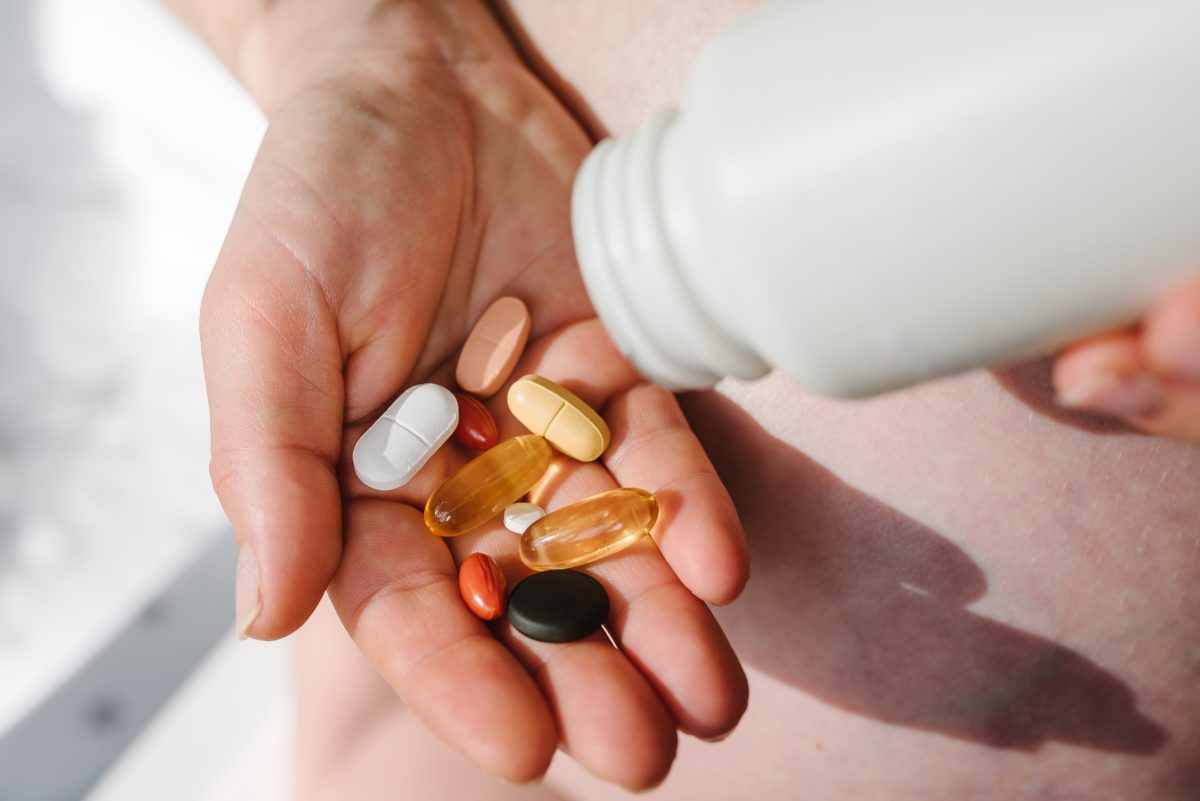Vitamins for IBS – which ones are needed + when to avoid
- Supplements
Several vitamins and minerals have been linked to improvements in general gut health and in IBS symptoms (1).
This article looks at the role of vitamins for IBS management – and to what extent taking a supplement might help.

Which vitamin deficiencies causes IBS?
IBS is a complex, multifactorial gastrointestinal disorder and as yet, there isn’t enough evidence to suggest a link between a specific vitamin deficiency and the risk of developing IBS.
However, research does suggests that there may be some vitamins which can play a role in managing IBS symptoms. For example, vitamin D and vitamin B12.
A deficiency in these vitamins may potentially affect the severity of your IBS symptoms.
Those with IBS who are following a low FODMAP diet may also be at higher risk of deficiency in certain vitamins due to cutting out food to manage their symptoms.
These include: calcium, iron, zinc deficiency as well as some B vitamins (2,3,4).
Therefore even though IBS isn’t directly caused by a vitamin deficiency, it’s important to ensure that you’re getting what you need from your diet and this may potentially include a supplement.
What vitamins can I take every day to help with IBS?
Rather than just taking vitamins for IBS, ensuring an adequate intake of nutrients through a varied diet would be the first step.
If your diet is lacking in certain vitamins and minerals – then it might be a good option to consider supplementation.
As people experience IBS differently, and everyone’s dietary needs are all very different. There isn’t one specific vitamin supplement that could be recommended to everyone with IBS.
Read on to learn more about specific vitamins for IBS.
Is a multivitamin supplement good for IBS?
A multivitamin is a supplement which combines different vitamins and sometimes minerals such as calcium or iron into a single dose.
You might be following a restrictive diet to manage your IBS symptoms and so a multivitamin could be helpful to fill any nutritional gaps and ensure that you’re getting adequate vitamins and minerals.
However it’s essential to check the label of the multivitamin to ensure that it doesn’t contain anything that’s likely to exacerbate your symptoms.
Some may have added fibres, artificial sweeteners or other additives – especially if following a low FODMAP diet.
Is vitamin C good for IBS?
As vitamin C is an antioxidant, it may help to reduce inflammation in the gut, potentially improving some IBS symptoms.
It has also been linked with positive improvements in the levels of certain bacteria in the gut (5,6).
Gut bacteria plays a vital role in your digestion and so it is important to look after it.
However, large doses of vitamin C (2-6g per day) may have a laxative effect – which can exacerbate diarrhoea (7).
Sadly, there is not enough evidence that supplementation with vitamin C for IBS is beneficial.
It is therefore better to concentrate on getting enough sources of vitamin C in your diet such as from fruits and vegetables.
Is vitamin D good for IBS?
Vitamin D is one of the most studied vitamins for IBS management. It is linked with the immune function of our gut and management of systemic inflammation (8,9).
The research shows that vitamin D deficiency appears to worsen IBS symptoms. So ensuring adequate levels may be helpful (9).
Recommendations vary slightly around the world. However the Scientific Advisory Committee on Nutrition (SACN) in the UK recommends that all adults take 10μg (400IU) of vitamin D3 per day throughout the winter months (10).
For those with dark skin, or people whose skin is mostly covered up throughout the year this is extended throughout the year (11).
The same research has shown that many people may be deficient in vitamin D (10). Our bodies make their own vitamin D after our skin has been exposed to sunlight.
Otherwise, we can get small amounts of vitamin D from food such as oily fish (including the bones) and other fortified foods.
As it’s difficult to get enough vitamin D from food alone, a supplement is generally recommended for everyone, not just those with IBS.
It’s worth noting that vitamin D can also be toxic at higher levels. The safe upper limit has been recommended as 4,000 IU / 100μg so it’s advisable to stay below that (11).
Make sure to check the labels on your supplements and speak to your GP or other healthcare provider if you have any concerns. They may recommend a larger dose if you’re deficient.
Overall, adequate vitamin D levels may help to modulate our immune response and reduce inflammation in the gut. This may potentially improve IBS symptoms.
At this time, however, it’s not completely clear what the links are between IBS and vitamin D.

Is vitamin B12 good for IBS?
Vitamin B12 is an essential micronutrient, used by the body for many things; including energy production and nerve health.
Supplementation with B12 has not been shown to treat or cure IBS symptoms. However, B12 deficiency can also mimic IBS symptoms – including abdominal pain and diarrhoea (12).
Those following restrictive diets may also be at risk from B12 deficiency. Therefore, it is important to ensure that you’re getting enough (2).
If you’re concerned that you’re not getting enough B12, your healthcare provider may recommend testing for B12 deficiency. They would also recommend supplementation as appropriate.
If you’re following a low FODMAP diet and are vegan or eating mostly plant-based foods, then ensure that your plant milks are fortified by checking the labels.
It’s also worth noting that organic plant based milks in the UK aren’t allowed to be fortified. So this may affect which ones you choose.
Is vitamin E good for IBS?
Vitamin E is an antioxidant which plays a role in gut health and immunity.
Adequate levels support general health, though supplementation with vitamin E alone has not been shown to have a direct impact on IBS symptoms (6).
Is vitamin water good for IBS?
Vitamin water would not usually be recommended as an additional source of nutrients for those with IBS. It’s usually a sweet, flavoured drink, containing added vitamins and minerals.
The additives contained in these drinks – including artificial sugars and flavours – may worsen symptoms of IBS in some people.
Plain water or herbal teas may be better choices for keeping you hydrated and managing IBS symptoms.
Summary
Overall, if you have IBS, vitamins may play a helpful role in filling the nutritional gaps if you have a restrictive diet or an existing vitamin deficiency.
However there’s not enough evidence at this time to show whether they directly address the underlying causes of IBS.
If you do choose to trial some vitamins for IBS, make sure to check the label. Many may contain ingredients that can make your IBS symptoms worse.
It’s important to chat with your GP, dietitian or healthcare provider about which vitamins may be the right fit for you.